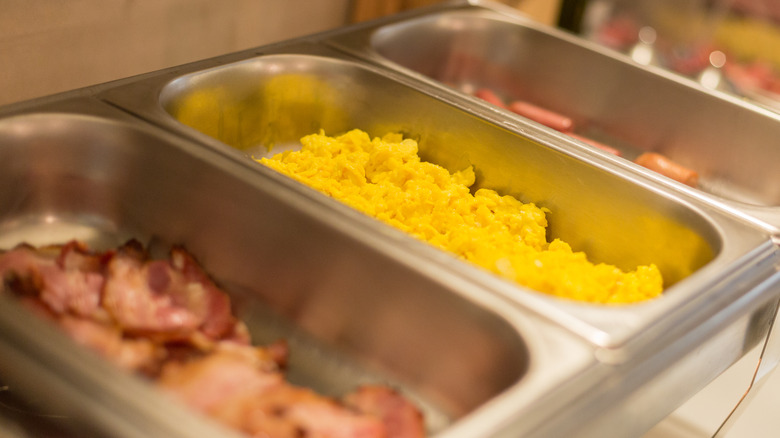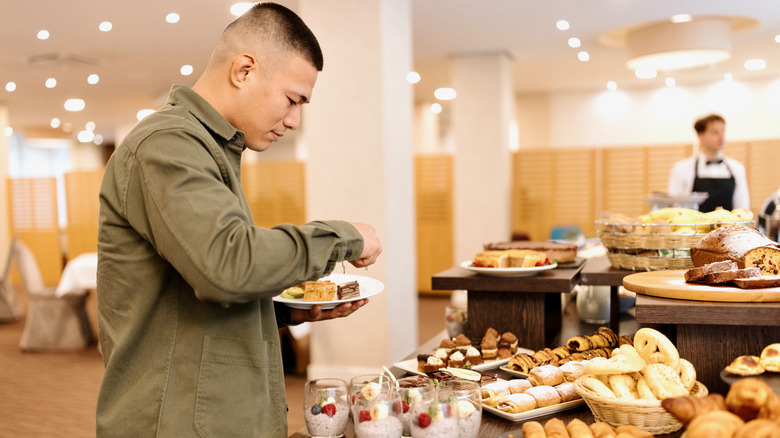Trust Us, Avoid The Scrambled Eggs At Your Next Hotel Breakfast Buffet
The free breakfast buffet is a perk many travelers look forward to when booking hotel stays. A selection of bagels, muffins, and cereal make up the typical offerings, along with bacon, sausage, fruit, pancakes, and the ever-present scrambled eggs. But you might want to think twice before filling up your plate with the fluffy yellow breakfast staple. Actually, you may be better off avoiding them altogether.
The main reason to steer clear is a simple one: They're not good. Do you ever wonder why hotel buffet scrambled eggs taste so much worse than the kind you whip up at home? It's because hotels often rely on powdered eggs or mass-produced liquid egg products in order to prepare them at scale. These products may contain actual dehydrated eggs but lack the flavor of freshly cracked eggs. They also contain additives and preservatives that prolong shelf life but could also affect the taste.
Hotel buffet scrambled eggs are almost always prepared in advance – sometimes in the microwave – and reheated multiple times throughout the service period. That's why the vat of scrambled eggs being served is often rubbery and spongy rather than fluffy and custardy.
The other hidden risk of hotel buffet scrambled eggs
Another reason to avoid the scrambled eggs at the hotel buffet has to do with safety. Since eggs are a perishable food item, they require proper temperature control to prevent the growth of harmful bacteria such as Salmonella. According to the FDA, eggs and egg dishes should never be left out of the refrigerator for more than two hours and should be reheated to 165 degrees Fahrenheit for serving. Unfortunately for hotel patrons, there's really no way to tell how long that tray of scrambled eggs has been sitting out.
It's also a gamble to assume the eggs are properly cooked. When preparing anything in large batches, even cooking is a challenge. Undercooked eggs can contain harmful pathogens that can cause foodborne illness if consumed, and no one wants to deal with that while on a trip. The CDC recommends cooking eggs to at least 160 degrees Fahrenheit to reduce the chance of getting sick. But again, there's no clear way for hotel customers to tell whether the eggs are properly cooked.
What to fill your plate with instead
So, scrambled eggs are likely off the table, but fear not; there are plenty of other options on the buffet line. If you're really craving eggs, a made-to-order omelet station that uses fresh eggs (be careful, some use imitation eggs or Egg Beaters) is a great choice.
You can also aim to fill your plate with fresh fruit, preferably with the skin on. Apples, bananas, and oranges pack a vitamin punch, as well as a healthy serving of fiber. There are a few fruits you may want to avoid, however, like sliced cantaloupe or other melons. These are prone to bacterial growth in general, especially when sitting out for long periods of time.
Freshly baked pastries, croissants, bread, yogurt, and oatmeal are all solid hotel breakfast buffet selections, too. From a health perspective, you're better off skipping any prepackaged muffins or baked goods, overly sugary cereal, and breakfast meats high in saturated fat. The best rule of thumb to follow is to prioritize freshly prepared and less perishable options whenever possible.


